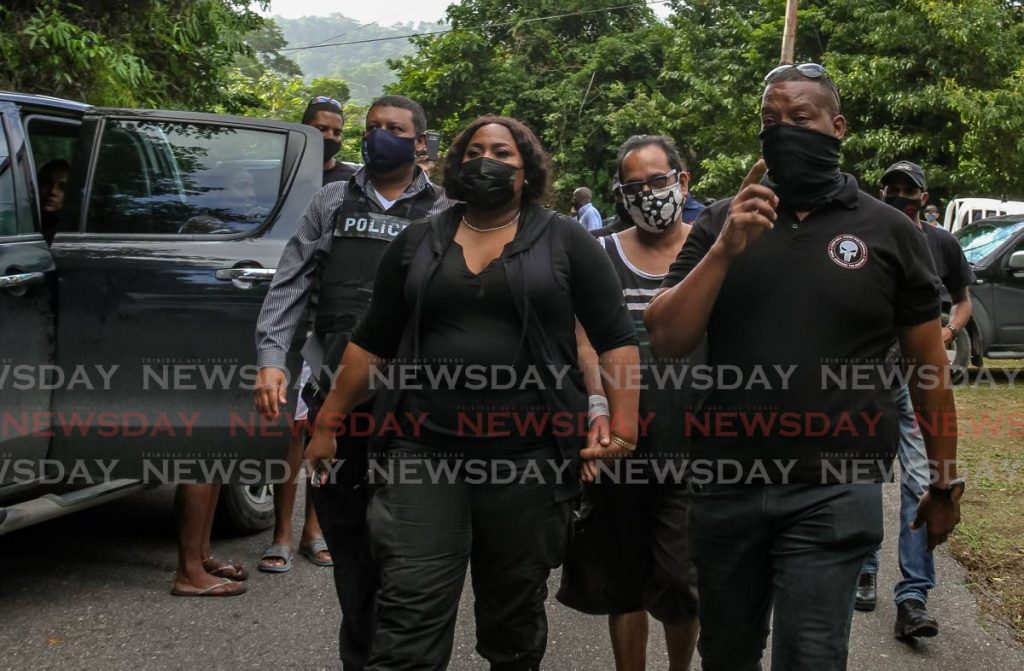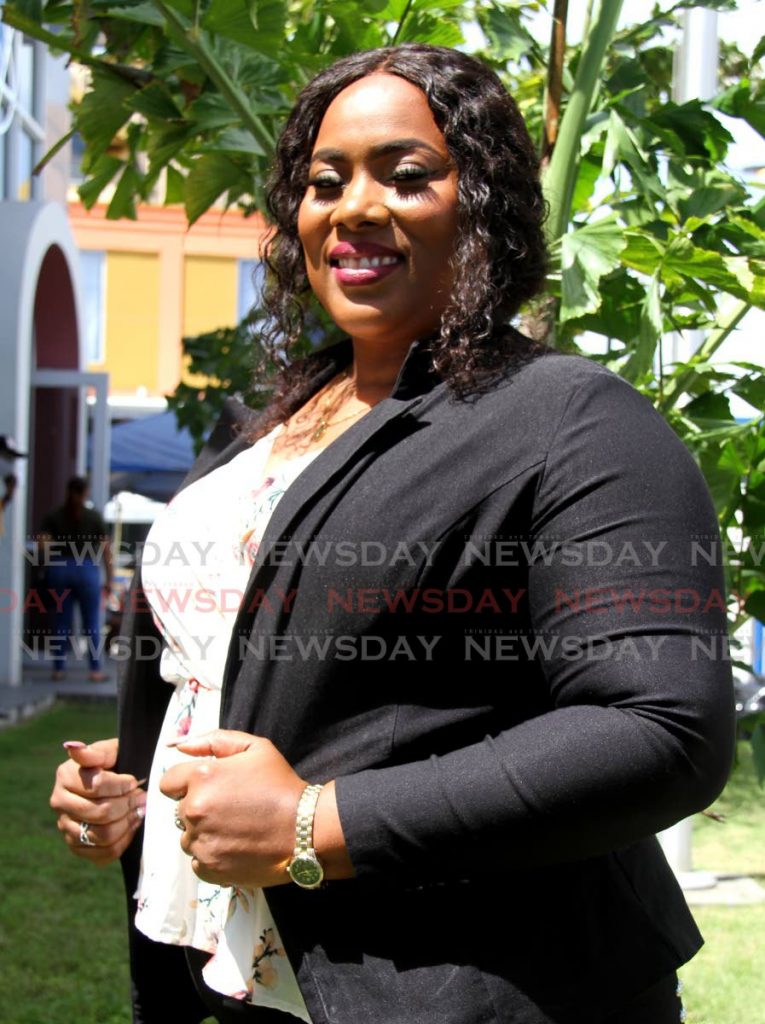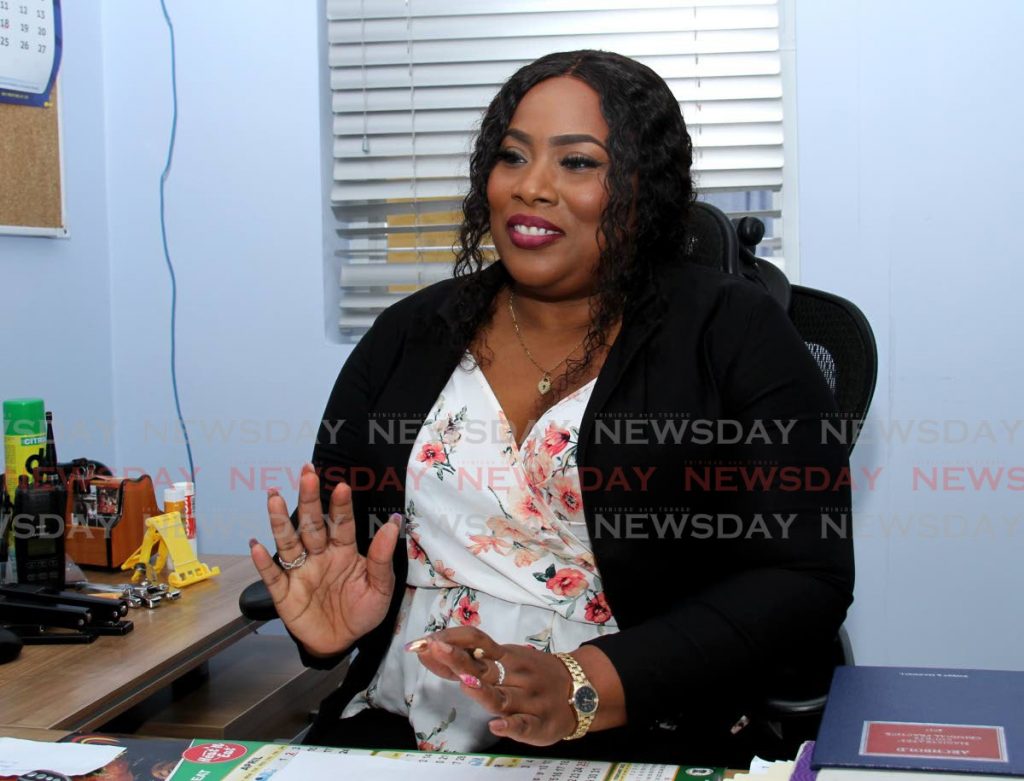PC Katina Williams lends a helping hand to a grieving father

On February 4, the nation looked on in horror as the body of 23-year-old court clerk Andrea Bharatt was found down a precipice, off a lonely stretch of road in the Heights of Aripo.
The discovery of Bharatt’s body marked the end of a six-day search and pleas by the authorities for the public to come forward with information on where she might be.
Bharatt disappeared after she took what she believed to be a licensed taxi to go to her home on Arima Old Road, after work at the Arima Magistrates' Court. Malabar resident Negus George was charged with the murder. His common-law wife Giselle Hobson was also charged for being in possession of stolen items that belonged to Bharatt. In a public outpouring of grief, vigils took place across the country in the days leading up to her funeral on February 12.
While many will remember the day Bharatt was found as a tragedy in the country's history, one policewoman will remember it as the day she fulfilled one of the most important duties of her career, giving strength and support to a grief-stricken father.
WPC Katina Williams is no stranger to the realities of policing.
An 11-year police veteran currently assigned to the Arima CID, she has seen and heard it all too many times to remember.
When Bharatt was found, her role was slightly different as she offered neighbourly care to the clerk’s father, Randolph Bharatt.
Photographs of Williams walking hand in hand with Randolph Bharatt, guiding him away from the crime scene, went viral. It was the image on the cover of the three daily newspapers.
In an interview at the Arima Police Station last Wednesday, Williams, 36, spoke about her experience in the search for Bharatt, why she reached out to the young woman's father, and what she thinks should be done to change how women are treated.
An interest in psychology inspired Williams to join the police service and she hoped to use her position as a police officer to help people and communities.

This is what she felt she was doing when she assigned to contact Randolph.
Her first call to him over the phone was for general information.
Over the six days, she would keep in touch with him, and the rest of the family, even as she dedicated herself to the search for Bharatt.
“Whenever information came in, I was ready to go.
“There was a time when I was in the office doing clerical work and we got some information and I went out there in my skirt going up in the bush.
“Both my knees got scratches. All of that is from being in the bush.
“It was worth it because we were looking for a life. A little scratch would be a small price to pay.”
Then a report came in that a body had been found. A senior officer told her to go and bring Bharatt's father to the scene.
“I was sitting in the front seat and I turned around and spoke with him. Every now and again, I would turn around and check on him because I’m wondering where his head was, what was he thinking.”
When they arrived, Randolph kept up a cheerful disposition, chatting with officers, but Williams sensed his unease.
His mood changed when he identified the body as his daughter.
She realised, more than any other officer, that Randolph needed strength and support.
“As we’re walking down the hill (away from the scene), we’re still chatting and he asked, ‘Can I hold your hand?’
“I told him that they (the public) may not deem it as professional but I realised there was nothing that could stop me from holding his hand at that point.
“He was a human being and I needed to be there for him in that way, so I interlocked my fingers with his and tried to extend a little strength towards him in that moment.

“In my mind I was saying I was going to get licks for this, I was thinking people would tell me all kinds of things about holding his hand but as a human being there was no way I could not hold his hand in that instance.”
It was a hard day for the nation, but like any day no matter how long it seemed, it eventually came to an end.
For Williams the stress and grief were far from over.
When she got home that day, she took some time to herself to try and relax and recuperate from her experiences.
Rest would not come easy as the images stayed with her for days.
Despite being a seasoned policewoman, Williams said the importance of a support system for officers on the frontline cannot be understated.
She said while there were resources in place for officers to receive psycho-social support, sometimes the ear of a trusted family member was all that was needed.
“I have a sister and she is like my personal psychologist, someone you can talk to, and she doesn’t live in Trinidad but we’re very close. She is the person I offload on.
“We need it as police officers.
“We need someone to talk to and yes, we have the psychological department that deals with counselling and stuff like that but to me it’s easier to have a support system within your family and friends who you can talk to about how you feel.”
At a time when allegations of police misconduct are frequent, many people may forget that officers are people too. Williams hopes people can understand this, and said reaching out to people in distress was not uncommon as officers routinely go beyond their duties.
Despite reservations about attending Bharatt’s funeral, Williams realised that like the family, she also needed closure.
“One of my girlfriends was there, she is also a police officer and I think she sensed that I was in a mess.
“I hid (at the) back of the church and I sat in the corner trying to be inconspicuous and I cried my eyes out. I had to get fresh tissues.”
Bharatt’s kidnapping and murder, like Ashanti Riley’s last December, has forced the country to take a hard look at itself in terms of the treatment of women.
The issue of violence against women was not lost on Williams who understands, through firsthand experience, what women face from some men who don’t respect boundaries.
“I don’t walk around when I’m off-duty with a sign that says I’m a police officer so there would have been instances while I’m exercising on the road, I would hear men making all these comments at me.
“Sometimes you feel so ashamed, you turn red. You wonder if they really said what they did.
“I am a police officer and sometimes I am uncomfortable.”
While catcalls and lewd remarks are disrespectful, Williams notes that women can face even greater danger if they are not aware of their surroundings.
Two years ago she came face to face with a possible attacker.
“I was exercising one evening at around 6.30 pm and it started to get dark and I was on my way back home when a man came out of the darkness and I wondered where he came out from.
“It’s sad and it’s disappointing because we want to enjoy life freely too. We don’t want to have to be looking over our shoulders and be uncomfortable and fill out this checklist of safety tips and procedures we should follow before going out.”
Her experiences coupled with her insight as an officer has led her to prepare her nine-year-old daughter, teaching her to recite the numbers of relatives in case of an emergency and even self-defence techniques.
Even so Williams knows that danger is still present and is doing her part to influence change by teaching her 14-year-old son the importance of respecting the opposite sex.
While the teenage years can be a difficult time, she said now more than ever parents should step up and guide their children, beginning with the music they listen to, something she believes contributes to delinquency. She has had her son recite the lyrics of some songs to understand how they demean women.
Despite the tragedy, Williams realised that for a brief moment TT was united for the sake of the Bharatt family and called on at-risk teens and criminals to use this moment as a turning point in their lives.
“See if you can use this situation to change your lifestyle.
“If they know they’re going down a wrong path, use this situation or the recent ones to change their life and change the choices they make because at the end of the day your destination is the result of a combination of choices.”
Williams’ not only reached out and touched another person that day, she touched the soul of a nation, reminding people that even in the most difficult times, help was never far away.


Comments
"PC Katina Williams lends a helping hand to a grieving father"